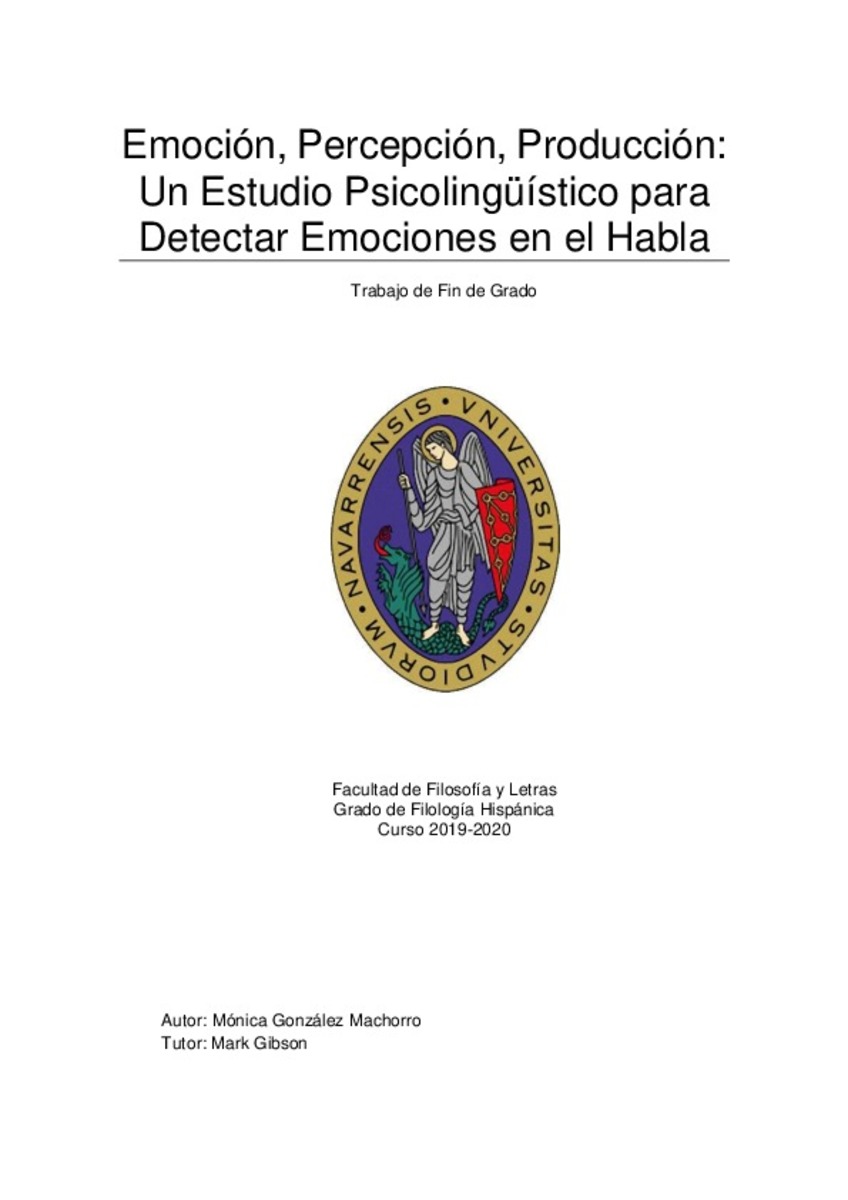Full metadata record
| DC Field | Value | Language |
|---|---|---|
| dc.contributor.advisor | Gibson, M. (Mark) | - |
| dc.creator | González-Machorro, M. (Mónica) | - |
| dc.date.accessioned | 2020-07-09T07:43:39Z | - |
| dc.date.available | 2020-07-09T07:43:39Z | - |
| dc.date.issued | 2020 | - |
| dc.date.submitted | 2020 | - |
| dc.identifier.uri | https://hdl.handle.net/10171/59101 | - |
| dc.description.abstract | Este trabajo se enfoca en la detección de las emociones en el habla mediante un análisis acústico y una técnica psicolingüística conocida como priming. Las emociones estudiadas son: felicidad, tristeza y el estado neutro. Este estudio está dividido en dos proyectos. El proyecto 1 consiste en documentar los parámetros acústicos de las tres emociones e investigar, a través de un experimento de percepción, si los oyentes utilizan estos parámetros para detectar las emociones. Se examinaron las respuestas de hispanohablantes y anglohablantes. El proyecto 2 tiene como objetivo entender la interacción entre los parámetros acústicos detectados en el primer proyecto y el procesamiento semántico. Este estudio pretende contribuir en la investigación en el campo del reconocimiento de las emociones en la voz y su aplicación en el desarrollo de sistemas de inteligencia artificial. | es_ES |
| dc.description.abstract | This study centers on the detection of emotions in speech using an acoustic analysis and a technique known as masked priming. Three emotions were studied: happiness, sadness and a neutral state. The study is divided into two main projects. Project 1 examines the different acoustic parameters found in the auditory stimuli and whether the subjects are able to identify these emotions in isolated, non-emotionally charged conditions. The second project aims to understand the relationship between the acoustic parameters and the semantic processing by using a masked priming technique in incongruent and congruent contexts. Results show that non-native speakers are more susceptible to priming effects due to differences in the interactions of visual/auditory modalities, and subsequent semantic processing. We situate the relevance of the study within the broader context of the study of speech emotion recognition and its application in machine learning algorithms and other models using deep neural networks | es_ES |
| dc.language.iso | spa | es_ES |
| dc.rights | info:eu-repo/semantics/openAccess | es_ES |
| dc.subject | Materias Investigacion::Filología y Literatura | es_ES |
| dc.subject | Emociones | es_ES |
| dc.subject | Habla afectiva | es_ES |
| dc.subject | Fonética | es_ES |
| dc.subject | Psicolingüística | es_ES |
| dc.subject | Procesamiento del habla | es_ES |
| dc.subject | Percepción | es_ES |
| dc.subject | Reconocimiento de emociones | es_ES |
| dc.subject | Emotions | es_ES |
| dc.subject | Emotional speech | es_ES |
| dc.subject | Phonetics | es_ES |
| dc.subject | Psycholinguistics | es_ES |
| dc.subject | Speech processing | es_ES |
| dc.subject | Perception | es_ES |
| dc.subject | Emotion recognition | es_ES |
| dc.subject | This study centers on the detection of emotions in speech using an acoustic analysis and a technique known as masked priming. Three emotions were studied: happiness, sadness and a neutral state. The study is divided into two main projects. Project 1 examines the different acoustic parameters found in the auditory stimuli and whether the subjects are able to identify these emotions in isolated, non-emotionally charged conditions. The second project aims to understand the relationship between the acoustic parameters and the semantic processing by using a masked priming technique in incongruent and congruent contexts. Results show that non-native speakers are more susceptible to priming effects due to differences in the interactions of visual/auditory modalities, and subsequent semantic processing. We situate the relevance of the study within the broader context of the study of speech emotion recognition and its application in machine learning algorithms and other models using deep neural networks | es_ES |
| dc.title | Emoción, percepción, producción: un estudio psicolingüístico para detectar emociones en el habla | es_ES |
| dc.type | info:eu-repo/semantics/bachelorThesis | es_ES |
Files in This Item:
Statistics and impact
Items in Dadun are protected by copyright, with all rights reserved, unless otherwise indicated.






